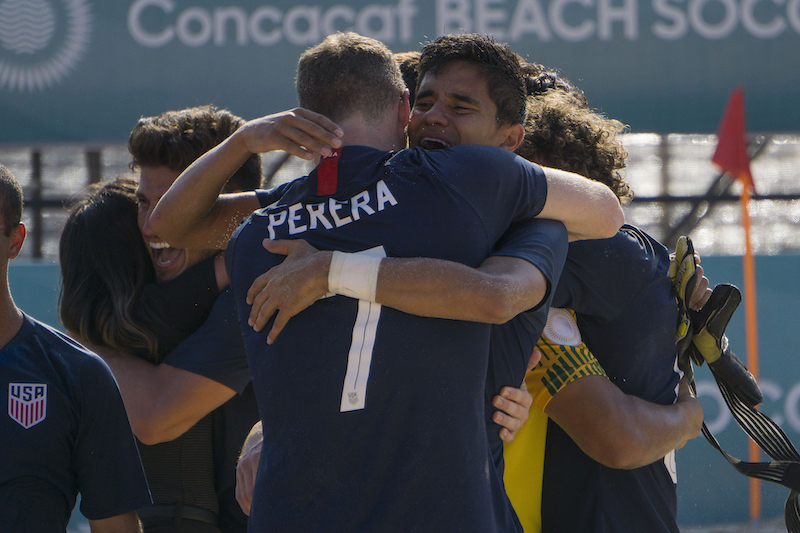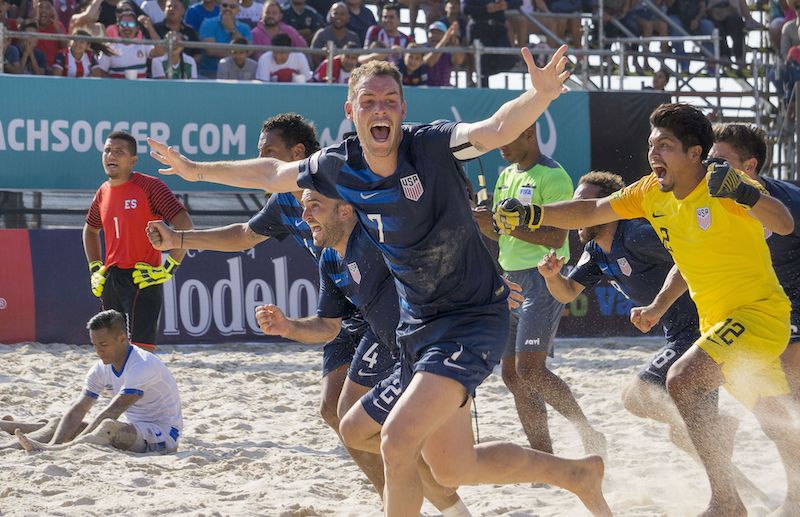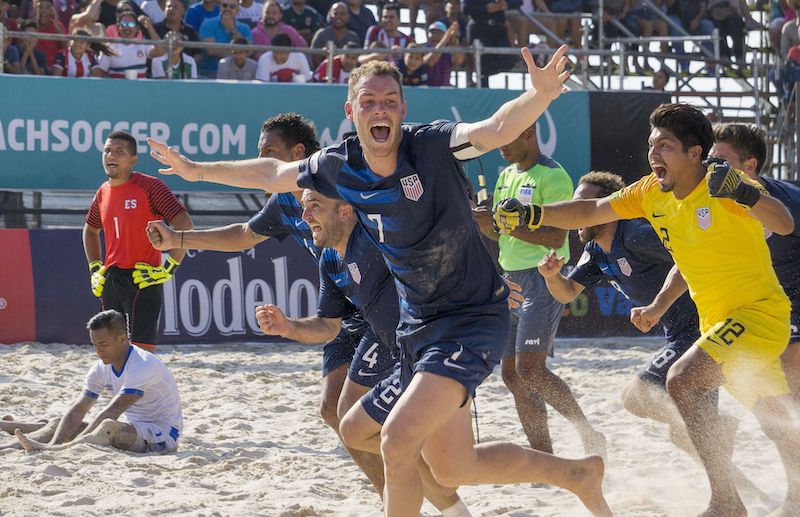Nick Perera is bold about his ambitions. He wants to win. He wants to entertain. He wants to set scoring records. He wants to be the best.
But most importantly - he wants to raise the profile of the U.S. Beach Soccer National Team and the discipline itself.
At 6-3, he’s putting the sport and the team on his broad shoulders. Already the USA’s leading scorer in World Cup qualifying and with five goals in his lone FIFA Beach Soccer World Cup appearance in 2013, the team captain was recently re-elected to the U.S. Soccer Federation’s Athletes’ Council.
“I wanted to involve myself in the Athletes’ Council because I felt that we need to give this beautiful game what it deserves,” Perera said. “I think this game deserves to be at a national level, international level, on television – everything.”
This is the abridged story of how a Spanish-born, Belgium-raised American became a NCAA College Cup champion, the Most Valuable Player of the Major Arena Soccer League and an international beach soccer star.
“I’m an extremely arrogant guy,” he admits. “But when it comes to my soccer and my willingness to learn, I’m extremely humble.”
That happens when the path to your destination is not a straight line.
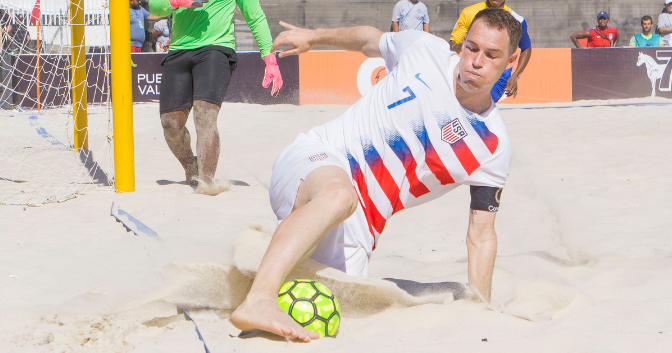
Prudencio and Dione Perera met in Montpellier, France some 30 odd years ago. Dione was there on a college exchange program from her hometown of Los Angeles and Prudencio was finishing his doctorate from his much closer hometown of Madrid, Spain.
They started their family in Spain, where Nicolas was born. He was a little over a year old when they moved to Belgium after Prudencio got a job with the European Commission.
Nick was raised speaking both English and Spanish. Living in Belgium, he quickly also learned French and Dutch.
”My mom’s always had an affinity for languages, I think I picked that up from her,” he says of Dione, who is fluent in English, French and Spanish and worked as a simultaneous interpreter. “I’ve always enjoyed that- to be able to go to different places and be able to speak the language.”
He’s since become proficient in Italian and Portuguese, a result of his international travels and knack for learning.
Nick did not hit his growth spurt until his late teens. Like most kids who take to sports in Europe, he was drawn to soccer.
“It was always soccer,” he said. “My dad loved soccer. I could probably count on one hand the amount of times I played another sport other than soccer.”
The family would often travel to Los Angeles for the winter holidays and spend every summer in Spain. There, he and his friends would play futsal on a neighborhood court for hours almost every day. In the afternoons, it was off to the beach – where they also would bring a ball to kick around.
Nick was the outgoing, active kid, but his younger brother, Lucas, was on the other end of the spectrum. Lucas is non-verbal autistic and extremely low-functioning. He lacks a sense of safety or security and doesn’t recognize danger, so he requires constant care.
“Every decision we’ve ever made as a family has been based on Lucas’s condition,” Nick said. “The primary reason for our move to the U.S. was that health care in the U.S. for special needs children was superior to Europe.”
While Lucas’ interpersonal communications are not necessarily warm, the family’s love and support for each other is always visible.
“You could tell things based on what he was doing and his body language,” Nick said. “He’s tough to read in some areas, but easy in others. He sees us and he lights up in his own way, but it’s very different. It’s hard to explain but it’s something that shapes every decision in your life - the way you see the world.”
In 2004, the Pereras moved to southern California. Nick was 18.
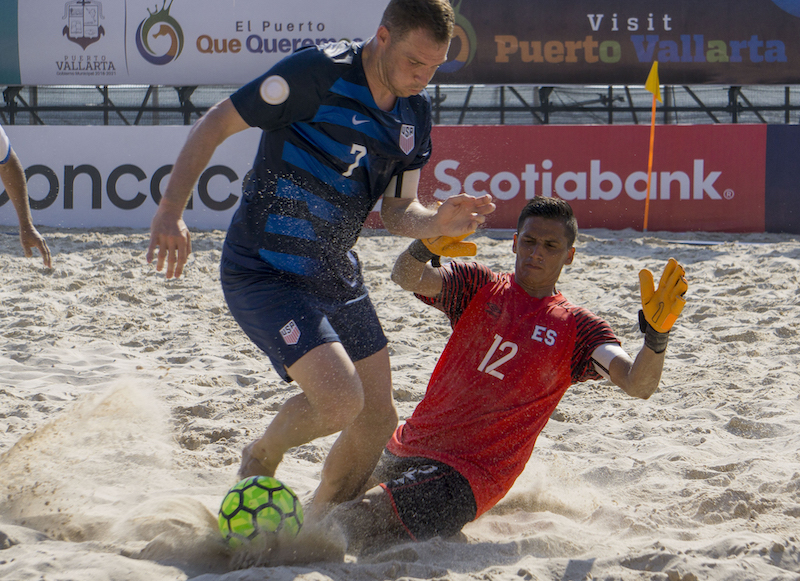
For someone as enthusiastic about his studies as he was about soccer, college was the perfect introduction to life in the USA.
Nick was set to attend the University of California-Santa Barbara, though since he was unknown, an athletic scholarship was not offered. Instead, he tried out for the soccer team that summer.
“I was cut after one week, because I couldn’t keep up with the level of physical demand of college soccer,” he admits. “Every part of my body was destroyed within five days. I don’t even think we touched the ball for the first four or five days.”
It was an awakening of sorts. Nick ended up playing club soccer that year and improved so much that he was able to walk on to the UCSB team the following spring. The minutes were tough to come by but he was adapting and improving.
The next year, seemingly out of nowhere, the Gauchos of UCSB won the 2006 NCAA College Cup as Perera scored the opener in a 2-1 win over UCLA.
“It was amazing,” Nick recalls. “We were a team with a lot of players who kind of fell through the cracks, who had a lot of grit and determination. We were unseeded, unranked and we went on to win the whole thing.”
Nick was offered a contract by Major League Soccer to leave college early and enter the league’s SuperDraft.
“My parents shot that down immediately,” Nick said. His family’s advice was to finish school, and deep down he knew that was the right decision.
He graduated in 2009 as an English major and walked in the summer before his senior season, which allowed him to take lighter classes and focus on soccer.
“I just wanted to have a well-balanced experience,” he said. “But as the season started progressing, I was way more invested in the athletic side. I kind of saw that there was an avenue for myself and soccer was what I always really loved. I just didn’t think I would ever live off of it. So it was something where I was kind of doing well and started thinking, ‘Maybe I could play at the next level.’”
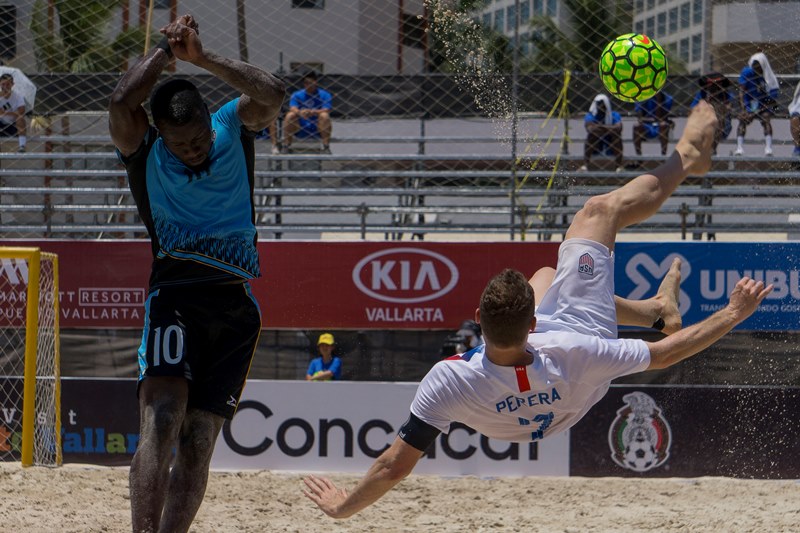
“I wish I knew then what I know now… about soccer, professionalism, taking care of your body, because I think I could have had a good outdoor career had I known. I didn’t care about weights, or strength training… I just wanted to play.”
Nick was invited to the MLS College Combine, but admits that he did not make a noticeable impression. He went undrafted.
He went to preseason with Chivas USA that spring and was offered a developmental contract. Coming from an extremely studious family with real-world professions, it was not appealing.
He decided to give soccer in Spain a shot, joining Segunda B side Benidorm, although he was loaned out to a third division team. The reality of soccer abroad hit fast. The club stopped paying its players after four months and two months later Nick cut ties and moved back to Southern California.
“I thought my stock would have gone up since I played in Spain, but it was the opposite,” he said.
He had trials here and there with teams in various lower-level leagues, but they rarely presented realistic opportunities to be seen and were often filled with broken promises.
“Honestly I hated it,” he said of that time. “Outdoor was this massive disappointment.”
Back in the San Diego area, he found himself playing indoor soccer to pass the time and developed a real affinity for it – it served as a throwback to those summer days in Spain. An opportunity to join the San Diego Sockers soon popped up.
It was a legendary team in the community and hosted a veteran-heavy squad. One teammate – Aaron Susi – saw Nick’s potential and recommended him to Keith Tozer, head coach of U.S. Futsal and the Milwaukee Wave. Tozer brought Nick to a futsal camp and then offered him a contract with the Wave.
“The team was unbelievable and I learned so much,” Nick said. “I loved indoor – I felt that as a target attacking player, the smaller size of the game and roster, I was much more involved. Milwaukee was amazing. I learned every day with coach Tozer and our group of players was special.”
That first year indoors also saw his beach career get started. The San Diego Sockers entered a team in a local beach soccer tournament. One of the other teams was a USA selection that U.S. Beach National Team head coach Eddie Soto put together to observe some lesser-known players.
Perera and the Sockers won the tournament. Afterwards, Soto invited Nick to join the Beach Soccer National Team in Miami the following week for friendlies against Mexico, Brazil and Spain.
Nick scored his first two goals on sand against Mexico.
“Everything started coming together for me,” he said. “The small-sided game started presenting options for me. As Milwaukee and the beach thing happened, I closed the book on outdoor. It was over.”
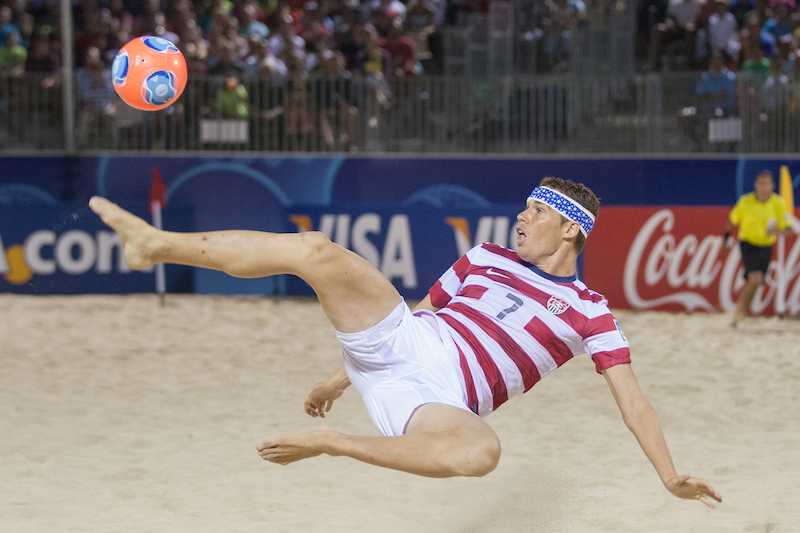
Perera at the 2013 FIFA Beach Soccer World Cup
Perera took Concacaf by storm in his first regional Beach Soccer Championship, scoring 11 goals in the 2013 tournament while leading the USA to the confederation title and a spot at the 2013 FIFA Beach Soccer World Cup in Tahiti.
“When I watch tapes from 2013 and watch myself play now, there’s a big difference,” he notes. “The tools I have now are far more polished. In 2013 I was really hungry. I showed up with something really big to prove. And we did really well. It was amazing – the first time I tasted international success with the National Team and it opened this entire world to me.”
Nick scored five goals for the USA at the World Cup in Tahiti and offers to join European beach soccer leagues quickly followed.
“It doesn’t click until you’re done,” he said of the experience in Tahiti. “We talk with the guys about savoring these moments, because you never know how many you get. You never know when it will be the last time you get to put on a U.S. National Team jersey.”
Nick continued playing professional indoor soccer. This past year, not only did he become player/coach for the Tacoma Stars, he was also voted MASL MVP. He’s also the Director of Coaching for San Marcos Revolution, a youth club near San Diego.
“It’s tough. It’s a passion for playing,” he said. “In order to access the soccer side I have to take care of the business side. It comes at large cost, and when I have these large life decisions, the only people who I look to for advice are my wife and my parents. Their support is enormous to me.”
Nick and his wife, Michelle, have a four-year old daughter, Sofia, and a two-year-old son, Theo. They live in Carlsbad, Calif.
He’s also part of the 20-member U.S. Soccer Federation Athletes' Council, which seeks to improve communication between athletes and the Federation.
“The more involved I’ve become with U.S. Soccer on the Athletes’ Council, the more I care and the more I realize the privilege that we have,” Nick said. “It gives you a better sense of the scope of the Federation and lets you see how things are done.”
This past year Nick played against U.S. Men’s National Team legend Landon Donovan in the Major Arena Soccer League.
“I know that I’ll never go down in the record books for U.S. Soccer as someone like Landon Donovan will but within the game of beach soccer I have goals on what I want to accomplish and numbers for the Federation that I want to accomplish also,” he said.
He might not be on Donovan’s level, but he’s making a dent in his own discipline. He’s already the USA’s all-time leading scorer in World Cup qualifying.
“Nick is someone who has committed himself to our sport, and he’s one of the best target forwards in the world right now,” said Soto. “His ability to play in different spots is a threat. He can build for us, shoot from distance or he can be a target and throw bikes. He’s a massive threat.”
And it’s not just homer talk. Josep Ponset is the Director of Competitions for Beach Soccer Worldwide, the Barcelona-based organizing body for international beach soccer competitions.
“Nick Perera is undeniably one of the most important players not only in Concacaf but also on the global stage,” Ponset said. “He’s one of the deadliest strikers in our sport, who combines great technique, strength and a deep knowledge of the game. Moreover, his bicycle kicks are some of the most dangerous and difficult to stop in the world.”
Nick understands the role he’s playing on the U.S. team and for the sport in general.
“I love the game,” Nick said. “But I also want to leave a footprint so that in 10 years, whatever I’m doing, this sport doesn't look anything like it does now. We can be the trailblazers of what it can be.”
Beach soccer fans worldwide have come to appreciate his thunderous bicycle kick goals. In 2016, a tally he scored against Russia was nominated for U.S. Soccer Goal of the Year.
“I’ve grown up thinking that sports are an avenue but sports are also entertainment – you have to entertain a crowd,” he said. “That’s been part of something I try to do, I try to put on a show. I want to show up on every field, and if someone asks a random fan ‘Who’s the best player?’ I want them to say me. I’m never satisfied, I’m really hungry and I think that’s led to some success.”
While he’s raised his personal profile, he won’t be satisfied until his team – the U.S. Beach Soccer National Team – earns the same respect.
“Teams in our region may look at us as a powerhouse but on the larger international stage people still don’t have the respect for us that I would like them to have,” he said. “Nobody takes you seriously unless you start beating teams. Little by little we’re carving away at it. We have a group of players who are extremely hungry to prove what we’re trying to do here, – not just to Concacaf, but to the whole world.”
